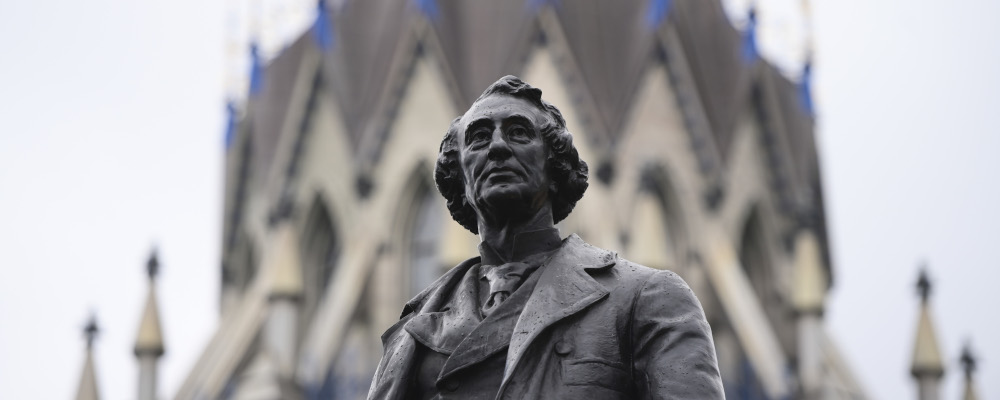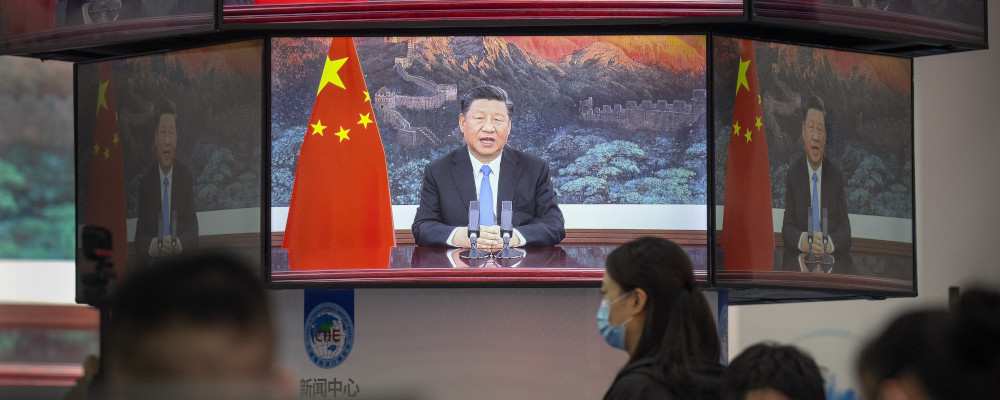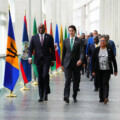As national angst over the latest horrors of the residential school system morphs into a physical war on public symbols associated with this ignoble chapter in our history, we are fast approaching a moment of national reckoning.
Do we, in the name of racial justice and reconciliation, strip our public spaces and public observances of the entirety of Canada’s “colonial” past? What would this mean for our national identity and how we imagine our society in the context of a “shared” past?
Answering these types of fraught questions requires getting at essence of history’s role in society. One of the best all time answers to this existential problem must be L.T. Hartley’s famous quote “the past is a foreign country; they do things differently there.” This brief, seemly flippant phrase, encapsulates beautifully what history is and isn’t and reminds all of us of the enduring utility of the past to the present, now and for all time.
For starters, Hartley’s assertion that the past is a “foreign country” illustrates the objective reality that history is removed from “us,” forever separate from the present and future.
To the point, history is over. It no longer exists. All the millions of Canadians who came before us are dead. Anything we do today to our memory of the past has no effect on previous generations’ perception of their successes and failures or how individual people were lauded or condemned in their own time.
This reality should be comforting in the current context. The current obsession with relitigating the lives of long dead political, military and civic leaders is, at best, a thought exercise. It is about “us” not “them” and the tearing down of statues does nothing to honour or dishonor the actual lives these people lived.
To react to the vandalism of statuary with outrage is pointless. No one is being harmed. This is a victimless crime. It is theatre of the mind (or the street). What matters, if anything, is what these acts of public anger says about who we are as a people today. And, here, serious self-criticism is warranted.
Relitigating the lives of long dead leaders is, at best, a thought exercise.
The subjugation and abuse of generations of First Nations peoples in residential schools is an undeniable and urgent national issue. It demands our attention and more importantly our ongoing, collective commitment to meaningfully make amends. Our response needs to be everything but symbolic. Yet this is largely what has happened in terms of public interpretation of the legacy of residential schools, the appropriating of blame and the righting of past wrongs.
Instead of focusing on the complicated task of reconciliation we are engaged in pointless acts of historical retribution that means nothing to its bronze encased victims and does little for the communities who are still living with the legacy of residential schools.
By attempting to defenestrate from our collective memory everyone from John A. Macdonald to Egerton Ryerson to Henry Dundas we are indulging in selfish, armchair acts of empty contrition. Acts that will ultimately obscure the very historical record that should be uncovered, debated, examined to inform our present-day responsibility and response to our fellow citizens who have been harmed.
This is the culture of narcissism that defines our time. We behave as if the past cares about the present. We invest in purely symbolic, individual acts of vandalism and destruction a public significance that belies their utter pointlessness. We embrace historical amnesia as the foundation of our future collective identity. And it all feels so good, so right, so just.
This narcissism is also at the heart of the current rejection of the truth contained in the second part of Harley’s quote “they do things differently [in the past].” This is not a statement condoning the past and everything contained within it. It is instead an acknowledgement that each historical period, the individual motives and particular events in any one moment of history, is unique.
To assume that any of us today would behave differently in the past, unaware of our future selves, is bizarre, magical thinking. In effect we are judging people in the past as if they are time travelers from our future aware of the full sweep of human history and their place in it relative to ours. This is wonderful science fiction but as a way of capturing the value of history to the present, it is as useful as bag of hammers.
The utility of history is precisely the context it provides or the very thing that we are destroying by purging in the present the visible symbols and observances of a shared past. It is precisely because of the juxtaposition of our present to our past that we know once-condoned social practices like slavery, public executions, and denying women equal rights are immoral.
History informs the present. It fills it with context and resonance anchoring our values to a chain of causality imbued with meaning. Its erasure does the opposite. Its erasure creates a collective amnesia in which the arbiters of the norms and mores of the present are our momentary impulses and desires, a rootless narcissism devoid of context, driven by the mob.
Let’s have a historically rich debate about the origins and consequences of residential schools. Unearth the motivations, beliefs and assumptions of its architects and its critics in the past. Use the tensions within and between historical periods to inform and enrich our own response to this tragedy.
To have any hope of doing this we need to stop the destruction of the public symbols and observances of our history. This is madness. It’s against our most basic interests now and into the future. It runs counter to the reconciliation we need to move forward. Let’s put down the hammers and pick up a history book before we lose our way back to who we are as a people.
Recommended for You

Ginny Roth: J.D. Vance, Pierre Poilievre, and how they slice their economic pie

David Polansky: As President Biden leaves the race, will the Democratic Party hodgepodge hold?

RCMP spending to protect MPs may have risen 112% since 2018, as Canadian politicians face greater rise in threats

Peter Menzies: The mainstream media should love Doug Ford, now that he’s subsidizing them










